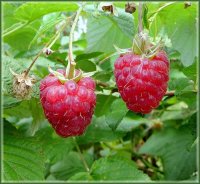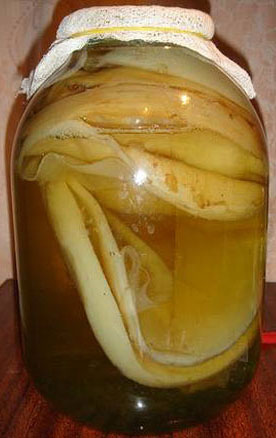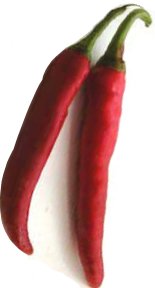Categories: "Food"
Малина

The Russian word for raspberry is малина. Raspberries are commonly used in Russia to treat sick throats and fevers during the chilly months of winter when colds are very common. As a little girl, I caught colds often and my grandmother made me hot black tea and added fresh raspberries to calm my throat. Sometimes she would add raspberry jam right into my tea which gave it a fruity sweetness. When I lay sick in my bed, my grandmother would come to me and say «ты хочешь чай с малиной?» meaning, “would you like some tea with raspberries?”
If I had one raspberry, I would say «у меня одна малина» "I have one raspberry". However, if I have more than one raspberry, I would use the plural term for raspberry (малины) and say «у меня две малины» "I have two raspberries".
Борщ

One of the most traditional Russian dishes is борщ. This is a soup primarily made from beets, potatoes, cabbage, meat, and carrots. This dish is commonly served with a dollop of sour cream and rye bread. This soup dates back to the 18th century and is commonly served in Russia, Ukraine, and Poland. Growing up, I can distinctly remember having борщ for dinner a few times a week. As a child, I remember helping my mother in the kitchen as she made this delicious soup. Today I make this soup for my family; it continues to be part of our family tradition.
I have noticed that in almost every Russian household in America, борщ continues to be a traditional soup and is made regularly by many of my Russian friends. I feel very happy when I visit my Russian friends and they offer me борщ. They say, «Ты хочешь борщ со сметаной? » “Do you want some borscht with sour cream?” I love it that a simple soup can bring family and friends together and help them stay connected and close.
Чайный гриб

Many Russian people have a чайный гриб (tea mushroom) in their home. Tea mushrooms are especially useful in lowering blood pressure, regulating the digestive tract, and promoting general wellbeing. Tea mushrooms are placed in a large glass container after which the container is filled with cold tea (usually black tea). Sugar is added to feed the tea mushroom because the mushroom uses the sugar to make yeast which is an important part in the brewing process. After five days of brewing, the tea beverage is ready for use. Because of the brewing process, this tea has a slightly sour taste which many people seem to enjoy particularly in the summer.
As a child, my mother made this tea beverage very often during the summer because it was refreshing, tasty, and healthy for the body. I remember telling my mother, «я люблю пить чай из чайного гриба! » “I love drinking tea from the tea mushroom!” and my mother would answer «да, чай из чайного гриба очень вкусный и полезный» “yes, tea from the tea mushroom is very tasty and healthy”.
Клубника
The Russian word for strawberry is клубника. Another word for strawberry is земляника. Земляника grows in forests and is smaller in size than a store-bought strawberry but it still has the same taste and texture. As a child, I enjoyed picking strawberries with my grandmother and parents. We took large baskets with us and spent many hours picking strawberries and enjoying ourselves. At the end of the day, we walked home with baskets full of strawberries and at home my family used some of these strawberries to make strawberry jam.
Today, I tell everyone «Я любила делать варенье из земляники» “I loved making jam out of strawberries.” I enjoy shopping for strawberries today because it brings back memories of me picking strawberries with my family.
Перец (часть первая)

The Russian word for pepper is перец. It means table pepper, which is the ground fruit of piper negrum, a plant of the Indian subcontinent, and it also means peppers like the bell pepper, the jalapeño, and the poblano, which are cultivars of capsicum annum, a plant native to the Americas. The latter are sometimes called chiles (or chilis or chilies or chillies).
The second е in перец is a fleeting vowel. The declension of the noun turns out like this:
| Sg | Pl | |
| Nom | перец | перцы |
| Acc | перец | перцы |
| Gen | перца | перцев |
| Pre | перце | перцах |
| Dat | перцу | перцам |
| Ins | перцем | перцами |
In English we might say "Do you like hot peppers?", but like most food items in Russian, you use перец in the singular when speaking abstractly: «Мама не любит острый перец, а я острое люблю» “Mom doesn't like hot peppers, but I love hot stuff."
The phrase “two peppers” nearly got me into trouble last week. I wanted to verify that one could use перец after numbers to count individual peppers, so I googled the phrase «два перца» “two peppers” and, lo and behold, «у меня на экране появилась всякая порнушка» “all sorts of porno appeared on my screen.” What the devil? It turns out that перец also has slang meanings of “hot guy” or “male reproductive organ.” Oh, dear. That means I accidentally used university resources to… “А вдруг меня уволят?» “What if they fire me?” If you think that's paranoid, you obviously haven't read Kafka's “The Trial.”
Sometimes the slang meaning of the word is simply “guy,” and the phrases "клёвый перец" and "классный перец" simply mean “cool guy.” Here's a non-pornographic joke that uses the word, along with a loose translation. [source]
| Приехали два перца на рыбалку. | Two guys went fishing. |
| Привезли с собой лодку, сети. | They brought a boat and nets with them. |
| Разместились в рыбацком домике. | They set themselves up in a fishing hut. |
| Решили перед процессом немного выпить, ну и … выпили. | They decided to have a bit to drink before [starting] the process, and, well… they got drunk. |
| Один утром просыпается, выходит «до ветру», смотрит, а поле за их домиком всё сетями усыпано. | One wakes up in the morning, goes outside to take a leak, looks around, and the field behind the hut has their nets strewn all over it. |
| Разозлился и побежал будить второго. | He got mad and ran to wake up the second. |
| - Ты что ж, придурок, сети-то по полю раскидал?! | "You idiot, what the heck did you thow the nets all over the place for?!" |
| - А где ты грёб — там я и кидал… | "Wherever you rowed, that's where I threw them…" |
So why is this funny? It's funny because the first was so drunk he rowed the boat on land, plus he couldn't remember doing so the next morning, plus the second was so drunk he threw fishing nets on land without objection.
| de | (spice) der Pfeffer; (vegetable) die Paprikaschote |
| es | (spice) la pimienta; (vegetable) el pimiento, el ají, el chile |
| fr | (spice) le poivre; (vegetable) le poivron |